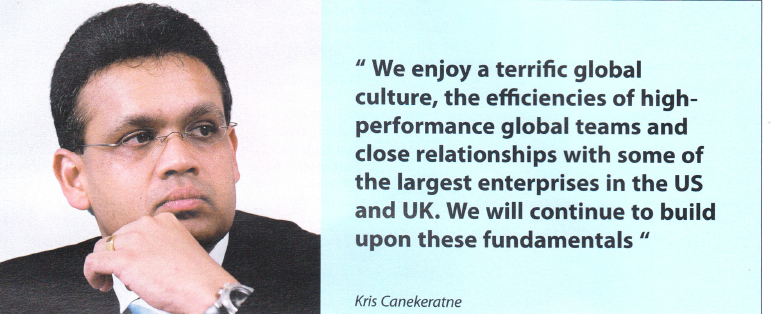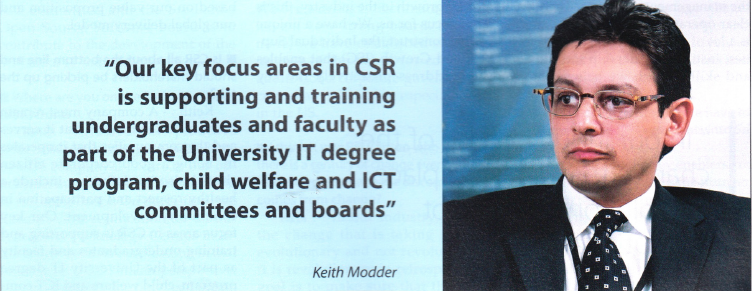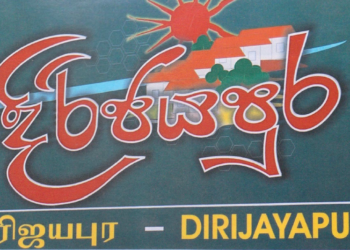Kris Canekeratne, Co-founded Virtusa in 1996 based on his core belief that software development practices could and should embrace the same efficiencies achieved by mature industries such as automotive and manufacturing. Today, Virtusa offers premier software services that bring software engineering efficiencies to a global blue chip client base. He spoke to Business Today together with Keith Madder, Managing Director – Asian Operations, on the company, its strategies, and the industry.
By Dinesh Weerakkody. Assisted by Karthiga R Ratnam
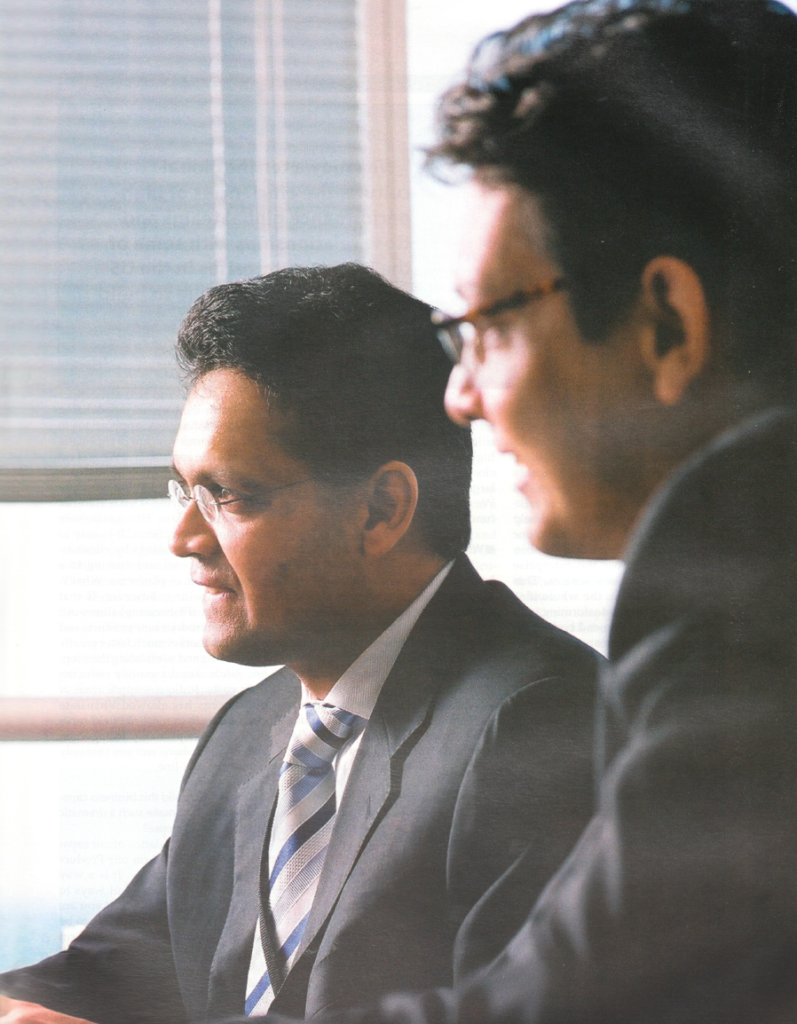
Can you tell us what your core business is and how you operate globally?
Kris : – Virtusa is in the IT services space. We provide consulting, Systems Integration (software development) and outsourcing services to our clients. From a consulting perspective, we work with our clients to define their current state (as-is state) and where they would like to be in a few years (to-be state). We do this through our Conceive – Conceptualize – Consulting service. Our Systems Integration service includes software development, integration, quality assurance, maintenance and deployment – essentially a full spectrum of services targeted to improve IT and software development efficiencies. Our end-to-end Outsourcing service is a continuation of our Consulting and Systems Integration service which helps our clients realize their vision. As opposed to being locked in to some previous generation inefficient IT environment, we help them transform and then outsource with an eye towards increasing their efficiencies. We help them conceive, transform, and outsource their IT and software development needs. Our services are executed through an extremely optimal global services model, where we have our colleagues and employees on-site as well as in our global infrastructures in Asia. We have over 2,600 employees today out of which approximately 900 are in Sri Lanka. We also have infrastructures in Hyderabad and Chennai India and points of presence in close proximity to our clients. All of our clients are either in the US or in the UK. We have been e:l(tremely fortunate in the last 3-5 years, our Compounded Annual Growth Rate (CAGR) has been over 45%. We are focused on the IT services and software development space. We have strong presence in financial services, telecommunications and hi-tech. Most of our clients are global 1000’s or large software developers.
Keith what role do you play at Virtusa?
The key part of my focus is people. There is also a Fiscal and Corporate governance responsibility for Asia operations. But the core part of the role is to build an environment that attracts and retains our biggest asset. The consulting and platforming mindset that we are building at Virtusa must resonate with both our clients and our people. The aspiration is really about creating a higher purpose of being for Virtusans. Especially, in a competitive market, talented people are looking for companies that really give them the opportunity of growth, and performing work with a high level of impact.
How do you differentiate from the rest of the offshore IT services industry?
Kris: – We are a part of the global IT services space. In this space our competitors are primarily the large Indian outsourcers. They are offshore services companies like Infosys, Cognizant, and Wipro or Systems Integrators like Accenture and IBM. The big difference according to our clients is our approach, being able to think and execute, traditionally most outsourcers do well on one or the other. A lot of the large Indian IT outsourcing companies have considerable strength on the offshore execution side but not that strong on consulting and conceptualizing. Many US based integrators are strong on the consulting side but do not have strong global execution strengths.
Kris : – One of the key attributes we look for in candidates is similarity and allegiance to our core values. You can hire some terrific people, but if they do not align themselves very quickly or you cannot make them become a part of the culture, it becomes contentious. Right at the start, we would like to see how someone is going to fit into our culture. Beyond that, at senior levels we look for experience and domain. At entry levels, we look for aptitude and clarity of thought, moving from problem to solution. These are some of the key areas of focus when we are recruiting. We have judiciously built a global operation that can help our clients think as well as execute. I believe the other factor in our value proposition/ differentiator is that we have over the years built a formidable understanding of the capabilities around Platforming. The reason this is so important is that, most of these large enterprises are riddled with inefficiencies and IT complexities. As a result of mergers and acquisition, the silo application developed within business units and businesses did things on their own instead of talking to one another. We go in and help them rationalize IT disparity into one or more core platforms that can then be leveraged across the enterprise to increase their efficiencies. This is why, once again, the whole idea about conceiving, transforming, and optimizing or end-to-end bodes well for our clients. These are some of the ways in which we differentiate. Looking at our competition, the offshore companies started in India and are scrambling to build strong presence, domain and relationships close to their clients in the west. From the beginning, Virtusa has developed a global operation and a global DNA which has given us a terrific foundation to grow from. This has also enabled us to build formidable trusted advisor partnerships with our clients.
If you look at the US consulting firms their mandate is actually to build some of the strength that the offshore companies already have. This, however, is easier said than done. While it might be easy to open-up an operation in the east, operating seamlessly as one global team is a daunting cultural challenge. But Virtusa’s global foundation has been of significant value and benefit. Virtusa is a US-based corporation with operating infrastructures in Sri Lanka and India. We enjoy a terrific global culture, the efficiencies of high-performance global teams and close relationships with some of the largest enterprises in the US and UK. We will continue to build upon these fundamentals.
What is your value proposition?
Kris : – Most of our competitors have gone down the path of cost arbitrage, doing whatever is being done by western clients at a lower cost basis, and are thriving with this value proposition. We came several years after they came up with the arbitrage value proposition. Our value proposition, on the other hand, is about increasing efficiencies by introducing the salient benefits of Platforming. Offshore services companies offer clients the opportunity to do what ever they are doing on a lower cost basis by leveraging cost arbitrage. We, on the other hand, work with our clients to identify opportunities to increase efficiencies and execute to this roadmap through a global delivery model. While our competitors impact just the cost line, we impact both the top-line and bottom-line by being able to reduce inefficiency and introduce new revenue-generating products and services to market faster. For example, most offshore services companies will take disparate applications and apply the same (or slightly higher) head count to execute these applications on a lower cost basis. Virtusa will evaluate these disparate applications and determine ways of rationalizing or consolidating these applications to a few platforms which will supersede the disparate applications. We will execute this transformation through our global delivery model that naturally leads to outsourcing. That is the crux of the differentiator. This is extremely appealing to our clients. It is easy to recognize TCO savings by eliminating redundancies and moving to a fewer number of platforms. What is more compelling, however, is that this strategy (Platforming) allows our clients to introduce new products and services to market much faster greatly accelerating and stimulating their topline while simultaneously reducing their costs. Judicious application of our strategy has allowed Virtusa to grow faster than most of our competition who are primarily focussed on providing offshore services that only reduce the cost-line.
How do you build this business capability in house to make such a dramatic bottom-line difference?
Kris :- The foundation of our capabilities is predicated on our Productization™ methodology. It is a way of consistently figuring out ways to leverage existing IT assets. If you are building new IT assets it needs to be done in such a way that it can perform more tasks than that immediate need. Basically, continuously improving and increasing efficiencies, this is at the heart of our overall approach. On top of that we have been fortunate to work with three different constituencies. Five years ago we knew little about banking but we had a value proposition that enabled us to go into a bank, tell and share with them how we would increase their efficiencies. Today we work with several banks and continue to expand our Financial Services practice. Platforming combined with the domain that we have developed in banking is a very compelling value proposition that allows us to accelerate time-2-value for our banking clients. The same thing is true for our communications and high-tech clients. Based on the growth that we have seen, we are looking to add professionals that have sector /practice experience that can compliment our technology professionals in financial services, telecommunications and high-tech to further expand our presence in these industries.
Yours is an organization that gets extraordinary results from technology professionals. Tell us how you do it?
Kris:- We really do adhere to the philosophy of building our stars from within. An increasing percentage of Virtusans come from campus, we go to colleges and hire these graduates. They are sent through our on-boarding programme, and work with some of our project teams so that they can assimilate into these teams. We have different training programs they can follow. Both at a personal level as well as specific experience for handson experience. Then, we take them through several different tracks – the engineering track, project management, program management track. We would love to explore ways in which we can include other tracks to this, like domain tracks etc. But a large part of it is based on career opportunities and career building. Keith :- We have also put in place a unique structure. The company has two business units. But we have a very clear people structure, which is two-fold in its initiatives. The first is to make sure that we retain our focus on people, as we grow larger. The second part is to make sure that people at Virtusa first have the opportunity from inside as opposed to going outside. We have a construct called the Individual Support and Growth (lSG). We focus on the ISGs, with 30-40 people per ISG and there is an ISG manager and career champions within that group whose sole responsibility is to monitor progress on projects and making sure that we are putting up those people for promotions and a rotation on projects as soon as we possibly can. People understand that if they get into Virtusa from the campus there is a very clearly articulated growth path in correlation with performance on their projects. Your career development is only limited to your potential to scale and grow with the company. This is always a powerful statement especially in India with so many opportunities opening up. If we can provide those opportunities within Virtusa then there is really no need to step outside. The primary driver is the ability to grow with the company.
How do you encourage innovation within your business?
Kris : – From our early days, one of the nicest things about Virtusa is that none of us go to sleep at night worrying about Virtusa becoming obsolete from a technology perspective. The reason for this is based on our business model, we are the firm that works with our clients on the frontline of what they are planning to do. Our goal is to go in and help our clients conceptualize, which is invigorating followed by helping them transform so the concept is realized. We then do outsourcing with an eye towards continuous improvement which is also very gratifying for our team members. This creates a culture of innovation that comes from within, based on what our teams and team members are doing. It is innate and intrinsic. It is rare in a services company that you can maintain a strong spirit of innovation but our team members have a knack of preserving and enhancing Virtusa’s ability to innovate within our practices, our clients and our teams.
What is the leadership style Virtusa follows:
Kris : – Simply stated leadership in Virtusa is all about- leaders ascribing all the success to their team members. When things go wrong, leaders need to look in the mirror and ask themselves a tough question – what could I have done to avert that crisis? Never to go to a team and say if you did this we would have succeeded. What this statement does is that it introduces preventive measures, do not wait until it is too late and then work out how to salvage a crisis. Figure out how not to get into a crisis. That culture is a part of Virtusa. This has helped us greatly to scale and continue to build a culture that is conducive. We are in the people space, we do not have any intellectual properties beyond that of methodologies and processes. We are not selling a product to anyone. We are in the IT services space which requires lot of reliance on people. They have to feel empowered, feel like they are contributing and what they do is extremely gratifying and meaningful. That is really the sanctuary that we have built here. It is really about the mindset.
What are the core elements in your culture?
Kris :- I would really like at every stage of this organization, our managers, teams, and people to own solutions. One approach is to create a prescriptive culture where the solution has been crafted and the execution is given over to a team. In this kind of culture, there is separation of knowledge and execution. We do not believe that this approach is conducive to the IT services space and companies’ like Virtusa. We prefer to frame the problem, and let the entire team collaborate on the solution. We have people on-site and in our global infrastructures exposed to the problem. By so doing, you find that the team comes up with the solution and they own the execution of the solution that they have come up with. We apply this same concept to the management at Virtusa. There are clear operating parameters set, there is a lot of focus on instilling core values, instilling leadership techniques and skills, which we believe, have demonstrable results and value, and making sure that we are there to break a deadlock if they arise. If anyone on the executive committee at Virtusa needs to be consulted for a normal execution that needs to take place we would not be able to scale at 45% CAGR for the past 4-5 years. It also makes us think about, not the immediate and urgent but more about what we need to do next. This is also liberating. This is recognized in our rewards and recognition, which is all about rewarding and recognizing the team. Innovation must happen on the periphery of the project team as opposed to only the leadership. This is significant.
If you are recruiting someone for your business, what are the attributes you look for?
Kris : – One of the key attributes we look for in candidates is similarity and allegiance to our core values. You can hire some terrific people, but if they do not align themselves very quickly or you cannot make them become a part of the culture, it becomes contentious. Right at the start, we would like to see how someone is going to fit into our culture. Beyond that, at senior levels we look for experience and domain. At entry levels, we look for aptitude and clarity of thought, moving from problem to solution. These are some of the key areas of focus when we are recruiting.
Let us talk about attrition, what are your attrition rates like and what are your retention strategies?
Keith: – With the many options created by growth in the industry, this is a real focus for us. We have a unique people construct, the Individual Support and Growth (ISG) that enables us to address proactively the key causes for attrition. The ISG focuses on a creating an ecosystem that has attributes of home, work, learning and fun within Virtusa. For example, the Starbucks proposition is about creating a comfortable environment called a third place, between the first place, which is your home and the second place, which is your work. Our aspiration is to create that third place in the workplace. People spend so much of time in the office that it is not just a job. It is about a sanctuary that provides gratifying work, learning and growth opportunities, making friends and having fun while growing in their careers, again tying back to that higher purpose of being. This is really a core aspiration around our people focus. Time will tell, and we are proud to have better retention than the industry. We have to keep working at it, because what worked one year ago will not work in the future.
At the moment what type of IT services do you offer in Sri Lanka?
Kris :- Our value proposition and differentiator is aligned with large enterprises with significant complexities. The large companies have some repeatable problems within and across industries. We found that our ability to serve those industries together with the opportunities within those industries have really kept us in the US and the UK We have never ventured beyond that. Right now we are scaling rapidly based on the growth of these two geographies where we have significant client relationships. We are extremely careful and deliberate about opening-up geographies based on our value proposition and our global delivery model.
Is CSR all about the bottom line and should shareholders be picking up the tab?
Keith : – A company must remain relevant to the market that it serves and the communities that it operates in. Being a good corporate citizen should also by definition include a healthy respect and participation in community development. Our key focus areas in CSR is supporting and training undergraduates and faculty as part of the University IT degree program, child welfare and ICT committees and boards. The other CSR initiative we were very proud to be associated was the post-tsunami response. We led an IT industry response in building a disaster recovery system in open source which the national disaster agency used to capture information regards missing person, matching of needs, etc. This was then submitted to the open source community and is now being implemented in Pakistan for earthquake relief. Our participation in the Ceylon Chamber ICT committee and the Sri Lanka Open Source Software board is to contribute to the development of the Sri Lanka IT industry.
” In our industry, a lot of the change that is taking place is evolutionary and not revolutionary “
Where are you on the Sarbanes Oxley (SOX) front?
Keith :- Virtusa has been pro active with SOX initiatives. As a subsidiary of a US company it is core to our operations in Asia and we are working to full compliance. On the IT front we have BS 7799 certification for all our Advanced Technology Centres in India & Sri Lanka. We are leading in that sense from a Sri Lankan perspective. We are probably the only Sri Lankan company that has achieved BS 7799 certification. Data integrity and security is absolutely key for our clients and we are consistently raising the bar on this front. Even from physical access to locations and project teams, we have segregated areas for specific project teams. Corporate governance and standards is a key part of our operating focus in Asia, and has become a significant focus in client delight. Kris : – It is important for companies to have a strong and active board. We are extremely fortunate that we have a very strong board. Furthermore, we have established sub-committees of the board for comp and audit. Good corporate governance is critical anywhere, but especially true in the US.
I think it was Bill Clinton who said that there is a century of change every 5 years. How do you manage the discomfort that comes from change?
Kris : – In our industry, a lot of the change that is taking place is evolutionary and not revolutionary. It is revolutionary in retrospect. Our goal is to make sure that there is a large cadre of people at Virtusa that are keeping abreast of the changes, so all those microevolutions adds up to a revolution. You start seeing patterns and you leverage them as you start working on the next evolution. Keith : – One of Alvin Toffler’s key remarks at the turn of the century was that ‘the illiterate of the 21st century will not be those who cannot read or write but those who cannot learn, unlearn, and re-learn’. We have to keep a very open perspective on learning. We have to learn from our clients who are innovating at the edge and our people. Think about the advent of the Internet and the impact it has had on business and globalization.
Moving on, what more do we have to do to encourage IT investments into Sri Lanka?
Kris: – Some of the key enablers are infrastructure, increasing the number of graduates, government incentives to those that set-up in Sri Lanka, peace and prosperity. Keith: – Peace is paramount. We have to also develop the infrastructure and provide a landscape for the business community to take advantage of. This is what you see in other countries, where the government has stepped aside and become the enabler.
” Our goal is to provide a significant competitive advantage to our clients that demonstrate both the top-line and bottom-line impact we can make”
On work-life balance, how do you generally relax?
Kris : – The pace at which a young engineer can grow from a career perspective at Virtusa is very significant. Although we promote the value of a healthy work-life balance, many of our team members join Virtusa because of the opportunities for rapid career development in a fast growing company. As we have scaled the operation, we have introduced many programs to enable our team members to enjoy a more balanced experience.
What keeps you up at night and what will your business look like in five years time?
Kris: – I believe that a large part of our future is predicated on what we have been able to do already and by keeping an open mind about where things are going. We have had the good fortune of growing at CAGR of 45%+ over the last five years. As a company and as a culture I would expect that we continue to be very focused on inculcating and fermenting our core values. That is the fabric of the organization that holds every one together. As far as markets, I believe that we will continue to expand into the verticals that we have already opened while selectively and deliberately opening new verticals.
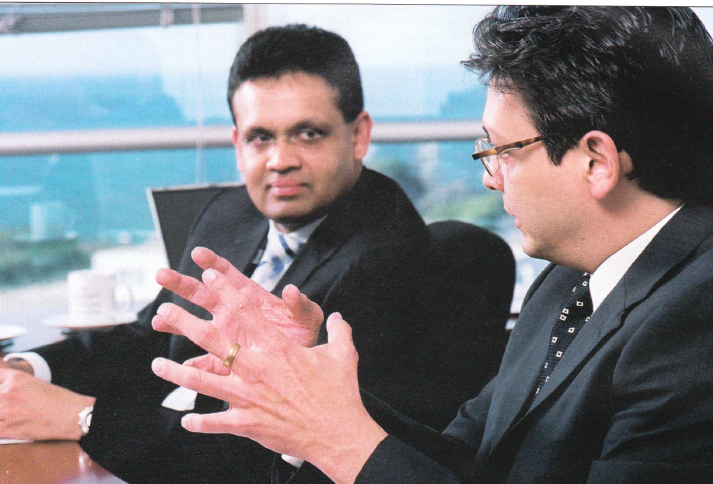
From the standpoint of what keeps us up at night, globalization is here to stay but I think that the key is to leverage high performance global teams to execute to a higher purpose. There are plenty of companies that use off shore teams to various and sundry things, but may not necessarily be for a higher purpose. There are multiple connotations of that. We are in a place and time where we can do that, but it is very important for us to continue doing that. It is important to contim_;e focusing on our core values. We always work hard towards figuring out a culture of excellence around everything we do.
Keith: – What is yet unknown. In a knowledge society innovation is happening at the periphery, and knowledge is a powerful asset depending on the timeliness of access to that information.
Will you continue to focus on the US market or look to India and China to fuel your growth?
Kris: – Yes, there will be. But right now Virtusa is focused on the US and the UK. The large organizations in our space will also stay focused on the arbitrage opportunities. We adopt a very consultative and collaborative approach and this is the key difference at Virtusa. Our growth over the last four fiscal years has come from clients who have continuously worked with us for over 12 months. This is an extremely important indicator and one that clearly defines the resiliency of our business model.
Virtusa is a private company owned by employees and investors from the venture community. Are you planning to go public?
Kris : – We have greatly benefited from our position of being a private company that has been at the highend of growth in our industry. We get to know everything there is to know about our competition and our competition knows very little about us. We are the younger, smaller kid on the block but growing faster than them, which means that over a period of time you catch up and surpass them. In our future, I am confident that there will be lots of great opportunities at Virtusa. While a lot of people think that going public is an event, we believe it is part of the process. We believe we are running a marathon not a sprint. But there will come a point, where for different reasons we will need to explore capital markets. But it is not something we lose any sleep at night.
Finally what more would you like to achieve from your business?
Kris : – Our aspiration is to continue to grow and scale the business. Our global DNA, differentiated value proposition, our team members and our clients have given us a terrific foundation. Our goal is to provide a significant competitive advantage to our clients that demonstrate both the top-line and bottom-line impact we can make.
